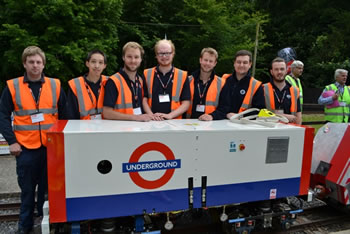London Team Wins National Prize
TfL apprentices designed the best small scale locomotive
A team of budding engineers from Transport for London (TfL) have won a national competition to design and manufacture the most efficient, reliable and quietest small-scale locomotive at a competition held at Stapleford Miniature Railway near Melton Mowbray, Leicestershire.
The team went head-to-head with teams from Derby’s Interfleet Technology Ltd (2nd), Birmingham University (3rd) and Huddersfield University (4th).
The locomotives are designed to work on 10¼” gauge railway line and compete whilst hauling a 600kg load – which includes one of the Railway Challenge judges.
July 2, 2014tution of Mechanical Engineers, who presented TfL with their award, said:
“TfL did fantastically well, particularly being competition newcomers, to produce the most innovative and reliable locomotive. It is fantastic to see the ingenuity, ambition and team-work of these young engineers. The Railway Challenge gives students, graduates and apprentices a fantastic opportunity to test their engineering skills and to get a taste of a real business experience.
“The Challenge presents a unique opportunity for these young engineers to convert their designs into practical applications. The competition is gruelling and runs along the lines of a real-life tendering process. The teams have to prepare a business case, safety case, financial plans and design, and have to build a locomotive from scratch. I would like to congratulate not only TfL, but all the teams for taking part.”
Luke Foy, Team Leader for the TfL team said:“We are delighted with this win given how hard the team has worked over the past months. Taking part in this competition has helped us gain first-hand experience of the whole process of developing a locomotive, which will be hugely valuable to our future careers maintaining and developing London’s rail and underground network.”
The Institution’s Railway Challenge, which is now in its third year, saw a new competition element in 2014 focusing on noise. The other practical challenges were the energy storage challenge, where teams need to ensure that the locomotive is able to store energy during braking and then use it to drive the locomotive forward again, the traction challenge and the ride comfort challenge. The teams were also assessed on a business presentation and the design of the locomotive.
In the end, competition newcomers, TfL came first storming to victory on the energy storage challenge – which holds the most marks for the competition. The TfL team managed to propel the locomotive forward almost 10 metres, compared to the next best locomotive, Interfleet, which moved it two metres. Interfleet did however win the traction challenge, Birmingham University won the noise challenge and Huddersfield University had the best score for their business presentation.
July 1, 2014
Related links
|
